助动词专题复习课件(共15张PPT)
文档属性
| 名称 | 助动词专题复习课件(共15张PPT) | 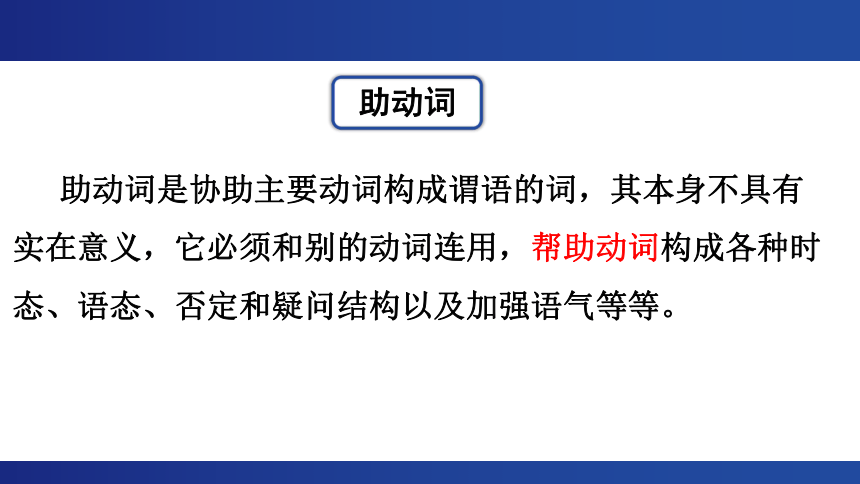 | |
| 格式 | pptx | ||
| 文件大小 | 157.0KB | ||
| 资源类型 | 教案 | ||
| 版本资源 | 通用版 | ||
| 科目 | 英语 | ||
| 更新时间 | 2023-04-08 20:52:54 | ||
图片预览

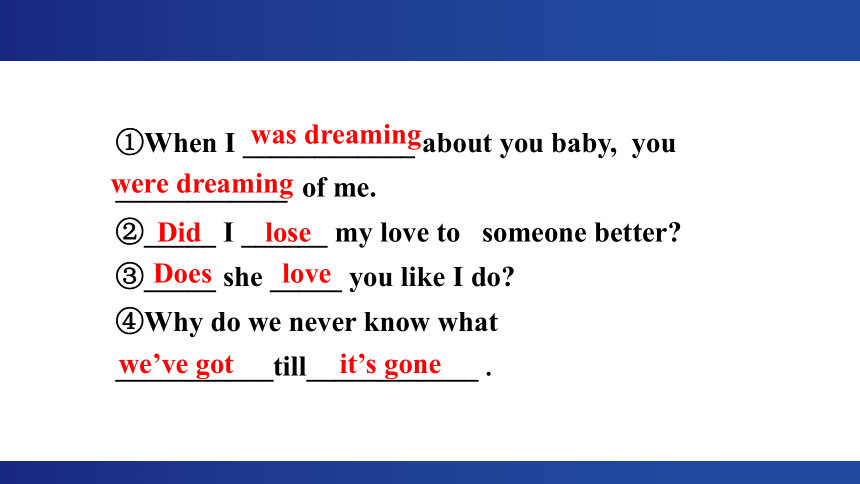
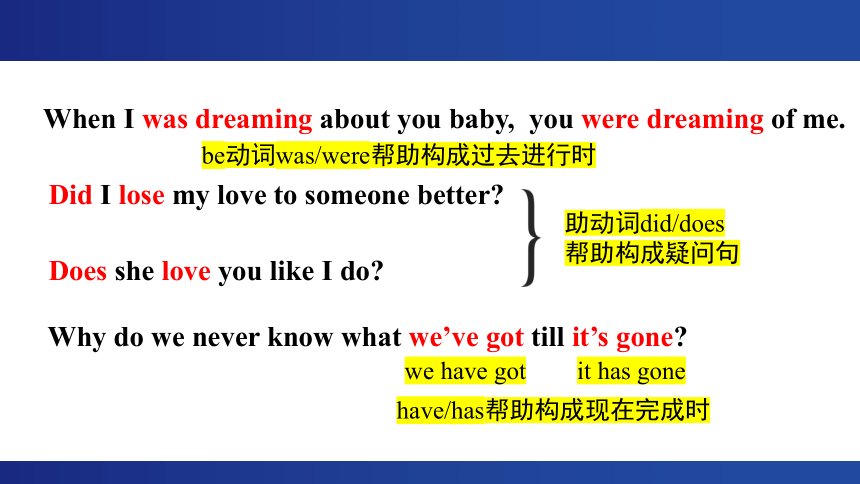
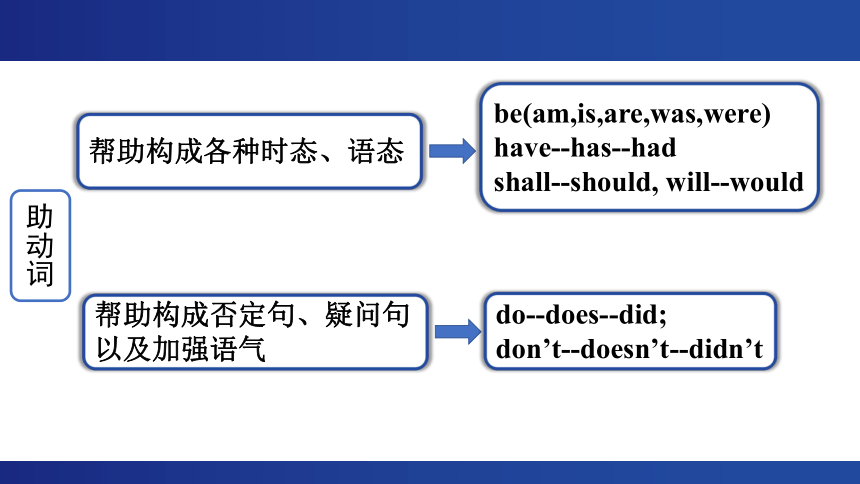

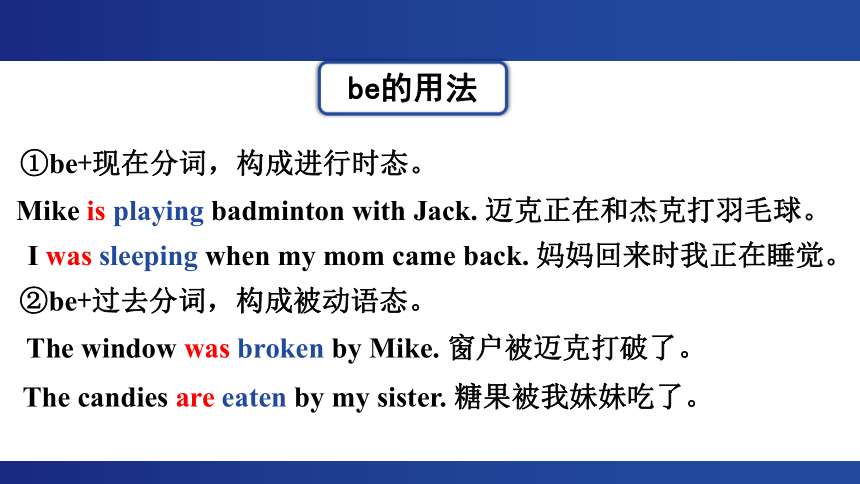
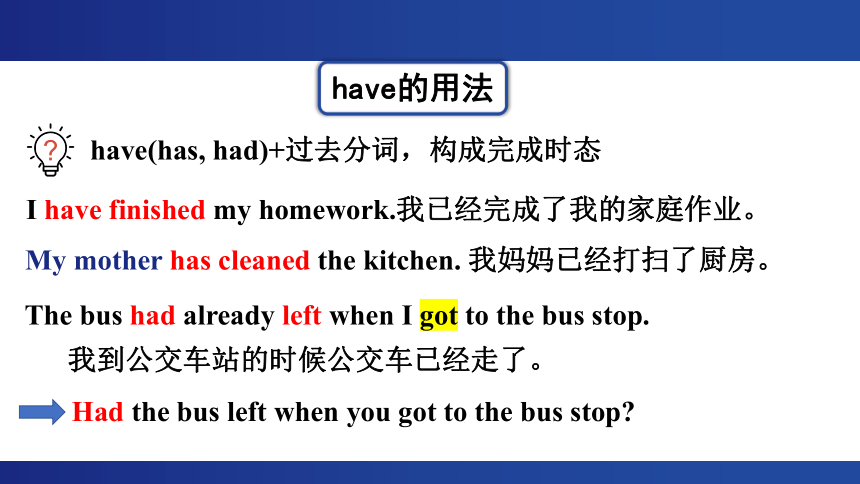
文档简介
(共15张PPT)
助动词是协助主要动词构成谓语的词,其本身不具有实在意义,它必须和别的动词连用,帮助动词构成各种时态、语态、否定和疑问结构以及加强语气等等。
助动词
①When I ____________ about you baby, you ____________ of me.
②_____ I ______ my love to someone better
③_____ she _____ you like I do
④Why do we never know what ___________till____________ .
was dreaming
were dreaming
Did
lose
Does
love
we’ve got
it’s gone
When I was dreaming about you baby, you were dreaming of me.
Did I lose my love to someone better
Does she love you like I do
Why do we never know what we’ve got till it’s gone
be动词was/were帮助构成过去进行时
助动词did/does
帮助构成疑问句
we have got
it has gone
have/has帮助构成现在完成时
帮助构成否定句、疑问句以及加强语气
帮助构成各种时态、语态
do--does--did;
don’t--doesn’t--didn’t
be(am,is,are,was,were)
have--has--had
shall--should, will--would
助动词
帮助构成各种时态、语态的助动词
be的用法
①be+现在分词,构成进行时态。
Mike is playing badminton with Jack. 迈克正在和杰克打羽毛球。
I was sleeping when my mom came back. 妈妈回来时我正在睡觉。
②be+过去分词,构成被动语态。
The window was broken by Mike. 窗户被迈克打破了。
The candies are eaten by my sister. 糖果被我妹妹吃了。
have的用法
have(has, had)+过去分词,构成完成时态
I have finished my homework.我已经完成了我的家庭作业。
My mother has cleaned the kitchen. 我妈妈已经打扫了厨房。
The bus had already left when I got to the bus stop.
我到公交车站的时候公交车已经走了。
Had the bus left when you got to the bus stop
shall和will的用法
shall (should), will (would) + 动词原形,构成将来时
He will visit the museum this weekend. 这周末他将去参观博物馆。
We shall be very happy to see you again.再次见到你我们会很开心的。
We never thought we should see you again.我们以为再也见不到你了。
He told me that he would visit the museum this weekend.
他告诉我他这周末将去参观博物馆。
shall作助动词只用于第一人称,而will则可用于第一、二、三人称。
帮助构成否定句、疑问句以及加强语气的助动词
do作助动词的用法
①帮助构成否定句和疑问句
I like apples.
I don’t like apples.
Do you like apples
She likes pears.
She doesn’t like pears.
Does she like pears
Tom bought some fruit this morning.
Tom didn’t buy any fruit this morning.
Did Tom buy any fruit this morning
do作助动词的用法
②放在动词原形前,帮助加强该动词的语气。
I like apples.
I do like apples.
She likes pears.
She does like pears.
③用来表示刚刚提过的动作,以避免重复。
She doesn’t like apples but I do. 她不喜欢苹果但是我喜欢。
like apples.
实战演练
①Look! The girl __________ (help) her mom sweep the floor.
②Jack __________ (be) in China for ten years.
③Mary __________ (go) to the zoo tomorrow.
④The sick boy__________ (take) to the hospital by police yesterday.
⑤Mr. Green didn’t __________ (want) to lose his job.
⑥Tina and Linda __________ (do) like playing volleyball.
is helping
has been
will go
was taken
want
do
大家来找茬
①Tom and his father doesn’t like watching TV.
②I have already take a lot of pictures.
③Be quiet! The baby sleeping in the room.
④I not went to the cinema yesterday.
⑤Will Mike comes to your party
⑥ My friend Tina do like reading books.
don’t
taken
is sleeping
didn’t go
come
does
帮助构成否定句、疑问句以及加强语气
帮助构成各种 时态、语态
do--does--did; don’t--doesn’t--didn’t
①帮助构成否定句;
②帮助构成疑问句;
③放在动词原形前,帮助加强该动词的语气。
④用来表示刚刚提过的动作,以避免重复。
①be+现在分词,构成进行时态
②be+过去分词,构成被动语态
③have(has, had)+过去分词,构成完成时态
④shall (should), will (would) + 动词原形,构成一般将来时
助动词
大部分助动词还可以作为有实际意义的行为动词使用。
① be (am,is,are,was,were)可以作为系动词,意为“是”。
You are my sunshine. 你是我的阳光。
My father is a doctor.我爸爸是一个医生。
② have/has/had可以作为行为动词,意为“有”。
I have a lovely dog. 我有一条可爱的小狗。
③ do/does/did可以作为行为动词,意为“做”。
We have nothing to do. 我们无事可做。
助动词是协助主要动词构成谓语的词,其本身不具有实在意义,它必须和别的动词连用,帮助动词构成各种时态、语态、否定和疑问结构以及加强语气等等。
助动词
①When I ____________ about you baby, you ____________ of me.
②_____ I ______ my love to someone better
③_____ she _____ you like I do
④Why do we never know what ___________till____________ .
was dreaming
were dreaming
Did
lose
Does
love
we’ve got
it’s gone
When I was dreaming about you baby, you were dreaming of me.
Did I lose my love to someone better
Does she love you like I do
Why do we never know what we’ve got till it’s gone
be动词was/were帮助构成过去进行时
助动词did/does
帮助构成疑问句
we have got
it has gone
have/has帮助构成现在完成时
帮助构成否定句、疑问句以及加强语气
帮助构成各种时态、语态
do--does--did;
don’t--doesn’t--didn’t
be(am,is,are,was,were)
have--has--had
shall--should, will--would
助动词
帮助构成各种时态、语态的助动词
be的用法
①be+现在分词,构成进行时态。
Mike is playing badminton with Jack. 迈克正在和杰克打羽毛球。
I was sleeping when my mom came back. 妈妈回来时我正在睡觉。
②be+过去分词,构成被动语态。
The window was broken by Mike. 窗户被迈克打破了。
The candies are eaten by my sister. 糖果被我妹妹吃了。
have的用法
have(has, had)+过去分词,构成完成时态
I have finished my homework.我已经完成了我的家庭作业。
My mother has cleaned the kitchen. 我妈妈已经打扫了厨房。
The bus had already left when I got to the bus stop.
我到公交车站的时候公交车已经走了。
Had the bus left when you got to the bus stop
shall和will的用法
shall (should), will (would) + 动词原形,构成将来时
He will visit the museum this weekend. 这周末他将去参观博物馆。
We shall be very happy to see you again.再次见到你我们会很开心的。
We never thought we should see you again.我们以为再也见不到你了。
He told me that he would visit the museum this weekend.
他告诉我他这周末将去参观博物馆。
shall作助动词只用于第一人称,而will则可用于第一、二、三人称。
帮助构成否定句、疑问句以及加强语气的助动词
do作助动词的用法
①帮助构成否定句和疑问句
I like apples.
I don’t like apples.
Do you like apples
She likes pears.
She doesn’t like pears.
Does she like pears
Tom bought some fruit this morning.
Tom didn’t buy any fruit this morning.
Did Tom buy any fruit this morning
do作助动词的用法
②放在动词原形前,帮助加强该动词的语气。
I like apples.
I do like apples.
She likes pears.
She does like pears.
③用来表示刚刚提过的动作,以避免重复。
She doesn’t like apples but I do. 她不喜欢苹果但是我喜欢。
like apples.
实战演练
①Look! The girl __________ (help) her mom sweep the floor.
②Jack __________ (be) in China for ten years.
③Mary __________ (go) to the zoo tomorrow.
④The sick boy__________ (take) to the hospital by police yesterday.
⑤Mr. Green didn’t __________ (want) to lose his job.
⑥Tina and Linda __________ (do) like playing volleyball.
is helping
has been
will go
was taken
want
do
大家来找茬
①Tom and his father doesn’t like watching TV.
②I have already take a lot of pictures.
③Be quiet! The baby sleeping in the room.
④I not went to the cinema yesterday.
⑤Will Mike comes to your party
⑥ My friend Tina do like reading books.
don’t
taken
is sleeping
didn’t go
come
does
帮助构成否定句、疑问句以及加强语气
帮助构成各种 时态、语态
do--does--did; don’t--doesn’t--didn’t
①帮助构成否定句;
②帮助构成疑问句;
③放在动词原形前,帮助加强该动词的语气。
④用来表示刚刚提过的动作,以避免重复。
①be+现在分词,构成进行时态
②be+过去分词,构成被动语态
③have(has, had)+过去分词,构成完成时态
④shall (should), will (would) + 动词原形,构成一般将来时
助动词
大部分助动词还可以作为有实际意义的行为动词使用。
① be (am,is,are,was,were)可以作为系动词,意为“是”。
You are my sunshine. 你是我的阳光。
My father is a doctor.我爸爸是一个医生。
② have/has/had可以作为行为动词,意为“有”。
I have a lovely dog. 我有一条可爱的小狗。
③ do/does/did可以作为行为动词,意为“做”。
We have nothing to do. 我们无事可做。
同课章节目录
- 词法
- 名词
- 动词和动词短语
- 动词语态
- 动词时态
- 助动词和情态动词
- 非谓语动词
- 冠词
- 代词
- 数词和量词
- 形容词副词及其比较等级
- 介词和介词短语
- 连词和感叹词
- 构词法
- 相似、相近词比较
- 句法
- 陈述句
- 一般疑问句和否定疑问句
- 特殊疑问句及选择疑问句
- 反意疑问句
- 存在句(There be句型)
- 宾语从句
- 定语从句
- 状语从句
- 主谓一致问题
- 简单句
- 并列句
- 复合句
- 主谓一致
- 主、表语从句
- 名词性从句
- 直接引语和间接引语
- 虚拟语气
- 感叹句
- 强调句
- 倒装句
- 祈使句
- 句子的成分
- 句子的分类
- 题型专区
- 单项选择部分
- 易错题
- 完形填空
- 阅读理解
- 词汇练习
- 听说训练
- 句型转换
- 补全对话
- 短文改错
- 翻译
- 书面表达
- 任务型阅读
- 语法填空
- 其他资料
